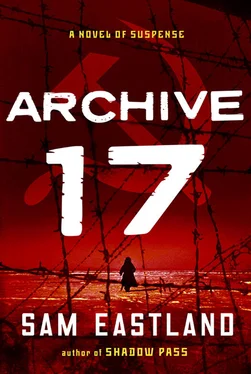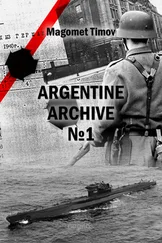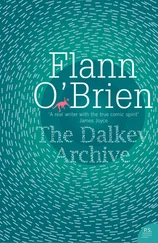Sam Eastland - Archive 17
Здесь есть возможность читать онлайн «Sam Eastland - Archive 17» весь текст электронной книги совершенно бесплатно (целиком полную версию без сокращений). В некоторых случаях можно слушать аудио, скачать через торрент в формате fb2 и присутствует краткое содержание. Жанр: Исторический детектив, на английском языке. Описание произведения, (предисловие) а так же отзывы посетителей доступны на портале библиотеки ЛибКат.
- Название:Archive 17
- Автор:
- Жанр:
- Год:неизвестен
- ISBN:нет данных
- Рейтинг книги:3 / 5. Голосов: 1
-
Избранное:Добавить в избранное
- Отзывы:
-
Ваша оценка:
- 60
- 1
- 2
- 3
- 4
- 5
Archive 17: краткое содержание, описание и аннотация
Предлагаем к чтению аннотацию, описание, краткое содержание или предисловие (зависит от того, что написал сам автор книги «Archive 17»). Если вы не нашли необходимую информацию о книге — напишите в комментариях, мы постараемся отыскать её.
Archive 17 — читать онлайн бесплатно полную книгу (весь текст) целиком
Ниже представлен текст книги, разбитый по страницам. Система сохранения места последней прочитанной страницы, позволяет с удобством читать онлайн бесплатно книгу «Archive 17», без необходимости каждый раз заново искать на чём Вы остановились. Поставьте закладку, и сможете в любой момент перейти на страницу, на которой закончили чтение.
Интервал:
Закладка:
From this case, the Tsar removed a cigarette. Each one contained a blend of tobacco prepared for him alone by Hajenius of Amsterdam. The frail rolling papers were emblazoned with a tiny silver double-headed eagle, the crest of the Romanov family .
As Pekkala stared at these objects, flinching momentarily when the Tsar struck fire from a jewel-encrusted lighter, it occurred to him how little they mattered to their owner at that moment. The Romanovs had built a wall of silver, gold, and platinum to keep the world away from them. But the world still found its way in. Like water filtering through cracks in a stone, it would ultimately shatter their existence .
“The Empress mentioned a nightmare,” said Pekkala .
The Tsar nodded, picking a fleck of tobacco off his tongue. He muttered a single word. “Kodynka.”
Then Pekkala understood .
On May 26, 1896, the day of Nicholas’s and Alexandra’s coronation, the Tsar and Tsarina had undergone a grueling five-hour service at the Assumption Cathedral in the Kremlin. Four days later, as dictated by tradition, the newly crowned couple would proceed to Kodynka field. There they would greet the thousands, perhaps even tens of thousands, of spectators who had come to wish them well. These spectators would be fed and gifts marking the occasion would be distributed. The Imperial couple would then proceed to the French embassy, where a celebration of unparalleled extravagance had been prepared. This included more than 100,000 fresh roses, which had been brought by express train from France .
The festivities began at Kodynka long before the Imperial couple were due to arrive. At one point, reacting to a rumor that the food tents were running out of beer, the crowd stampeded. More than a thousand people were crushed to death, many of them falling into shallow drainage ditches dug in lines across the field .
As the royal procession began its journey to Kodynka, the dead and dying were loaded onto carts and transported from the field, forming a macabre procession of their own. In the confusion, cartloads of disfigured corpses ended up among the lines of ornate coaches bearing the jewel-encrusted guests who had been invited to the ceremony .
To make matters worse, the Imperial couple were persuaded to continue with their schedule and attend the French embassy gathering .
Although guests at the party remarked on the obvious distress of the Emperor and his bride, the image of the pair waltzing, surrounded by thousands of bouquets of roses, remained in the minds of the Russian people. The royal couple had danced while their subjects were dying. And for a couple who were every bit as superstitious as the people whom they ruled, the omen seemed clear from the start .
“In my dream,” the Tsar told Pekkala, “I am at the French embassy, greeting the guests. But there are no ambassadors, no heads of state, no cousins who are kings. Instead, it is the dead from the Kodynka field. They trail their blood into the hall and the orchestra plays and they cling to each other with their mangled fingers and dance on their shattered limbs, staring into each other’s faces with their bulging eyes.”
“The dead are dancing?”
“All around me. The music never stops.” The Tsar inhaled on his cigarette. A moment later, two gray jets of smoke streamed from his nose. “And they are laughing.”
“But why?”
“Because they don’t know they are dead.” The Tsar swung his legs down from the bed and walked over to the window. Drawing back the curtains, he stared out at the velvet sky .
“Why did you send for me, Majesty?” asked Pekkala. “You know I can’t protect you from your dreams.”
“That may be true,” replied the Tsar, “but with all that Finnish witchcraft in your blood, I thought perhaps you might be able to tell me what it means.”
He already knows, thought Pekkala, only he cannot bring himself to say the words. That is why the dream comes back to him and why he will run from it for the rest of his life, scattering gold and jewels in its path in the hope of distracting the beast which is pursuing him. But the beast does not care about his treasure, and it will hunt him down and kill him in the end .
“Four seven four five!”
Pekkala’s heart lurched as the barracks door flew open and a guard walked in, calling out Pekkala’s prison number.
It was still the middle of the night.
Awakened from his waltzing trance, Larchenko tottered back to his chair by the door.
“Four seven four five!” the guard called out again.
Pekkala climbed out of his bunk and stood at attention, bare feet cringing against the cold floorboards.
The guard’s flashlight sliced through the musty air of the bunkhouse, until it finally settled upon Pekkala. “Put your boots on. Come with me.”
Pekkala wedged his feet into the wooden-soled boots he had been issued and clumped after the guard. As he emerged into the Siberian night, the first breath felt like pepper in his lungs.
He followed the guard across the compound until they reached the commandant’s office.
“In there,” said the soldier, and without another word he trudged back to the guardhouse.
While Pekkala was being marched across the compound, Commandant Klenovkin had been watching.
Ever since Klenovkin had learned that Pekkala would be handling the investigation, he’d been dreading this meeting with his former prisoner.
When Klenovkin had mentioned the murder of Ryabov in his weekly report, he’d had no idea that Stalin would come to hear about it, much less put Pekkala on the case. Nothing good can come of this, he thought, as anxiety twisted in his gut. One way or another, those White Russians of the Kolchak Expedition had been the source of all his troubles. As soon as they arrived, they had formed themselves into a gang which virtually took over the camp, and even though most of them had died from the usual effects of overwork, malnutrition, and despair, the few who remained continued to exert a powerful influence.
Klenovkin blamed the White Russians for the fact that he had never received the recognition he deserved. All the commandants who had started out at the same time as he did were senior consultants for the Dalstroy company. They lived in comfort in the great cities-Moscow, Leningrad, Stalingrad. They ate their lunches in fine restaurants. They took their holidays at resorts on the Black Sea. Klenovkin had none of these luxuries. The nearest restaurant, a rail station cafe serving kvass and smoked caribou meat, was more than eight hundred kilometers away.
The only sign Klenovkin had ever received from Dalstroy that they appreciated him at all was an ashtray, made of pinkish-white onyx, which he had been awarded for fifteen years of service to the company. And he did not even smoke.
The way Klenovkin saw it, he had been left here to rot among these Siberians- chaldons , as they called themselves. To Klenovkin, they were all the same-a dirty and suspicious people. They trusted nobody except their own kind. I could live a dozen lifetimes here, thought Klenovkin, and I would still be a stranger to them. Every time he heard that train departing from the Borodok railhead, it was all he could do not to run down there and jump aboard.
But it was impossible. What held him back was not the guards and the stockade fence but paperwork, quotas, and fear. As far as Klenovkin was concerned, he was as much a prisoner as any convict in the camp.
But now, perhaps, all that was going to change.
As much as he had hoped never to set eyes on Pekkala again, Klenovkin knew that if anyone could get to the bottom of Ryabov’s murder, it would be the Emerald Eye.
Читать дальшеИнтервал:
Закладка:
Похожие книги на «Archive 17»
Представляем Вашему вниманию похожие книги на «Archive 17» списком для выбора. Мы отобрали схожую по названию и смыслу литературу в надежде предоставить читателям больше вариантов отыскать новые, интересные, ещё непрочитанные произведения.
Обсуждение, отзывы о книге «Archive 17» и просто собственные мнения читателей. Оставьте ваши комментарии, напишите, что Вы думаете о произведении, его смысле или главных героях. Укажите что конкретно понравилось, а что нет, и почему Вы так считаете.











